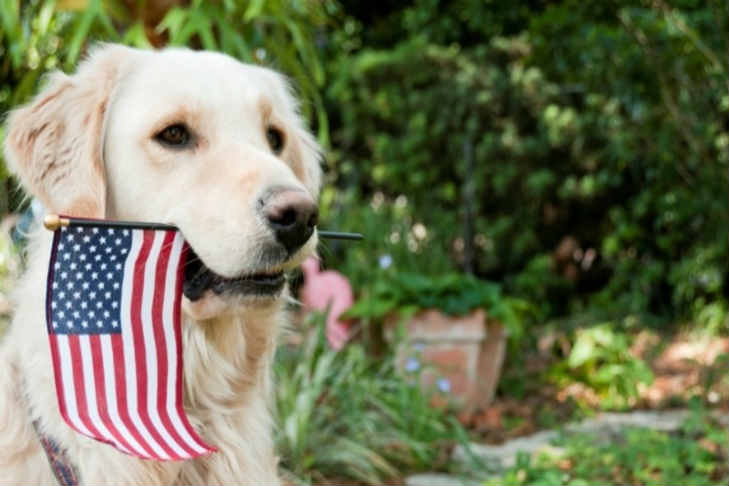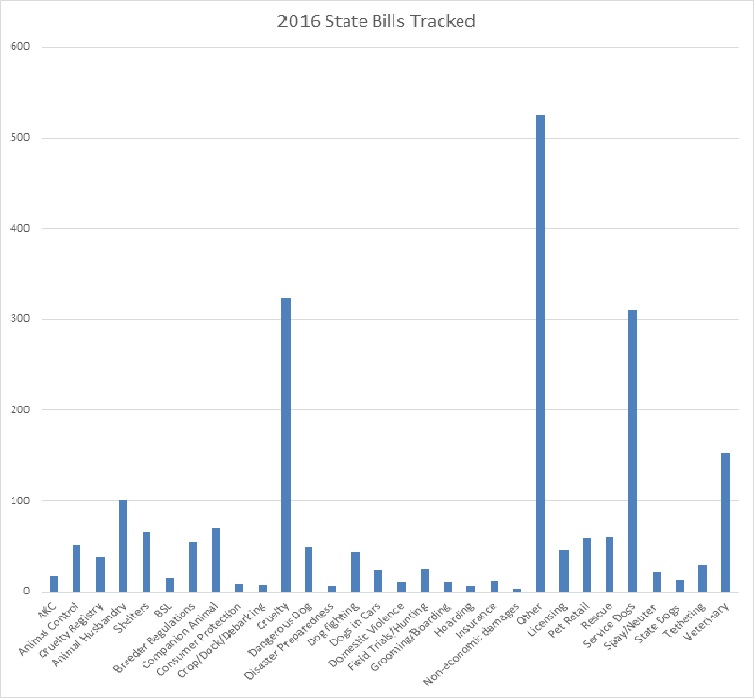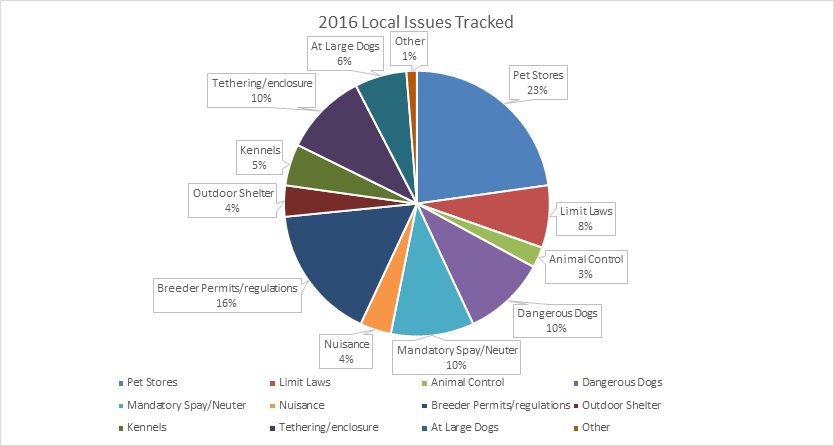
2016 was a very busy year for AKC Government Relations (AKC GR) and for AKC state federations, clubs, legislative liaisons, and all who advocate on behalf of dogs and responsible dog ownership.
The number of legislative proposals impacting dogs that AKC GR tracked in 2016 increase to more than 2,200, from a previous high of 1,700 in 2015. AKC GR tracks legislation on the federal, state, and local levels of government. The vast majority of measures tracked in 2016 came from state legislatures; however, we are also seeing an increase in the number and variety of anti-breeder measures introduced at the local level.
The GR Team also tracks state and federal regulatory changes that impact dog ownership and related issues. In 2016, more than 845 regulatory issues were monitored.
Not every bill or proposed regulatory change AKC monitors has a direct impact on dog owners, but the sheer volume of proposals demonstrates that animal issues continue to be a hot topic with the public and policymakers. This is why it’s so important for you – and dog lovers, owners and breeders – to cultivate positive relationships with your elected officials, especially at the local level, before an issue arises so that when an issue does come up, they know they have a dog expert in their constituency and they can reply on you (Read AKC GR’s recent article for some suggestions on how to get to know your legislators).
2016 Trends and Statistics
As we have seen the past several years, regulating and restricting dog breeding and breeders remains a hot topic. These bills typically include licensing and inspections, strict engineering standards, and often limits on animal ownership or on the ages during which a dog can be bred. Many of these bills also attempt to define a breeder based solely on the number of intact animals a person owns, rather than on actual breeding activity and sales. While some bills, such as House Bill 4353 in Michigan, define regulated breeders as those who maintain 15 or more intact females that have previously been bred, accurately counting whether an animal is a “breeding animal” is very difficult for law enforcement to determine, and puts the burden on the owner to prove whether or not they have actually bred (or not bred) that many animals.
It is also important to note that many of these regulations were introduced on the local level – particularly in states where animal rights activists have not been successful on the state level. States such as Florida and Indiana, among others, have had numerous several local breeder laws introduced, including breeder and intact animal permits, inspections, and other similar proposals. We expect this to continue in 2017.
In addition to regulating breeders, there was a significant push in 2016 to regulate pet stores. In particular, proposals on the state and local levels sought to prevent pet stores from selling animals unless those animals came from animal shelters or rescues. The AKC has significant concerns with this movement, as it limits the options for consumers to choose a purebred dog, and more importantly, only allows pet stores to sell dogs from unknown origins and unknown genetic health and temperament histories. In New Jersey, a bill was introduced that would have completely removed the state’s consumer protection laws, as part of a requirement that pet stores sell only dogs from rescue/shelters or rescue/shelter distributors. This is a dangerous precedent.
In response to this trend, AKC issued a new policy position statement in 2016 that declares our support for freedom of choice in selecting a pet and opposition to measures that restrict this choice.
Another topic that received significant attention in 2016 was the issue of what to do when dogs are left unattended in vehicles. Ten states introduced legislation that sought to address this issue. The AKC agrees that no dog ever should be left in a vehicle when the temperatures are such that the dog is in immediate danger. AKC shared concerns that some of these bills would also allow anyone to enter a vehicle, remove a dog, and be exempted them from liability. As pet theft also continues to be a growing issue, AKC was concerned that the liability loophole would increase in the theft of pets. AKC worked with many clubs to obtain clarifications to protect dog owners in situations where the dog becomes lost, significant unnecessary damage is done to private property, or if the dog bites someone as a result of an unknown person entering the vehicle. In Virginia, five separate bills were introduced on this issue. AKC was pleased to help develop a compromise was reached where only law enforcement, animal control officers, and similar personnel are exempted from liability for entering other people’s cars to remove a dog.
On the local level, we saw several counties and municipalities that decided to rewrite their entire animal control code. Many of these codes have been in place for decades and appropriate updates were necessary. However, some of these rewrites also included unreasonable or prohibitive increases to license fees for owners of intact animals, breeder regulations, and other problematic proposals. Nuisance laws, such as how long a dog is permitted to bark outside and how a dog should be tethered or fenced in on an owner’s property, were also common in these rewrites. The AKC worked closely with numerous local clubs to address these issues when we were made aware of them.
As can be seen on the charts pictured, these are just a few of the myriad of issues addressed over the past year. While it is important to note that these charts are not comprehensive (and many bills encompassed more than one category), it shows that a broad range of issues were brought forward in 2016 affecting all breeds, and impacting everyone from commercial dog breeders to an owner of one dog. Many of these bills never received a hearing or were ultimately defeated, thanks to the proactive and dedicated efforts of our clubs, legislative liaisons and local advocates. For a list of highlights of 2016 successes, click here.
Looking Ahead – What to Expect in 2017
We tracked more than 2,200 bills in 2016 – and not every legislature was in session. We fully anticipate this number to increase again this year, as every state legislature will meet and there are many new legislators with ideas they wish to put forward. Already, we have seen bills filed in multiple states that would regulate breeders and amend cruelty laws – including requiring those in an ongoing trial to pay for the cost to care for their animals.
AKC Government Relations will continue to work hard to educate legislators and keep you informed, but we need your help! If you hear of an issue – particularly on the county or municipal level – please contact us at doglaw@akc.org. It is also important that your club have an appointed Legislative Liaison on file with us who will be willing to quickly forward e-mails we send with the latest information on what is occurring in your state and community.
Also be sure to check out our Legislative Action Center at www.akcgr.org, where you can find our latest legislative alerts from around the country, see a full list of all bills we are tracking sorted by state/territory, and find talking points and other resources you can use when communicating with your legislators.
Charts of 2016 issues monitored by AKC GR. Please note that some proposals encompassed more than one category.



